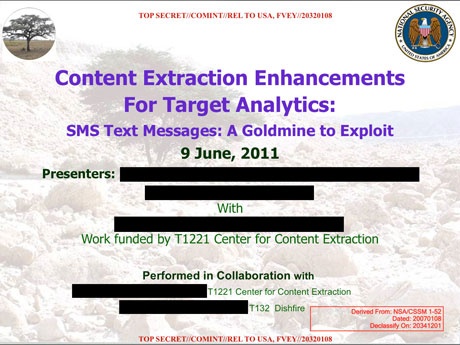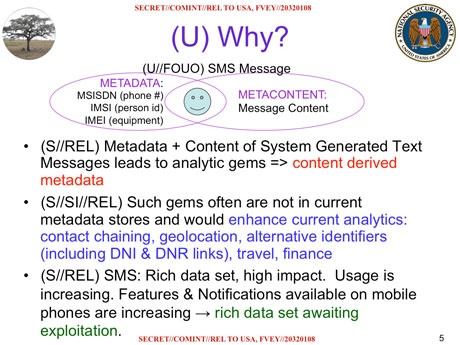• NSA extracts location, contacts and financial transactions
• 'Dishfire' program sweeps up 'pretty much everything it can'
• GCHQ using database to search metadata from UK numbers
• Dishfire presentation on text message collection – key extracts
• 'Dishfire' program sweeps up 'pretty much everything it can'
• GCHQ using database to search metadata from UK numbers
• Dishfire presentation on text message collection – key extracts

The untargeted collection and storage of SMS messages – including their contacts – is revealed in a joint investigation between the Guardian and the UK’s Channel 4 News based on material provided by NSA whistleblower Edward Snowden.
The documents also reveal the UK spy agency GCHQ has made use of the NSA database to search the metadata of “untargeted and unwarranted” communications belonging to people in the UK.
The NSA program, codenamed Dishfire, collects “pretty much everything it can”, according to GCHQ documents, rather than merely storing the communications of existing surveillance targets.
The NSA has made extensive use of its vast text message database to extract information on people’s travel plans, contact books, financial transactions and more – including of individuals under no suspicion of illegal activity.
An agency presentation from 2011 – subtitled “SMS Text Messages: A Goldmine to Exploit” – reveals the program collected an average of 194 million text messages a day in April of that year. In addition to storing the messages themselves, a further program known as “Prefer” conducted automated analysis on the untargeted communications.

On average, each day the NSA was able to extract:
• More than 5 million missed-call alerts, for use in contact-chaining analysis (working out someone’s social network from who they contact and when)
• Details of 1.6 million border crossings a day, from network roaming alerts
• More than 110,000 names, from electronic business cards, which also included the ability to extract and save images.
• Over 800,000 financial transactions, either through text-to-text payments or linking credit cards to phone users
The agency was also able to extract geolocation data from more than 76,000 text messages a day, including from “requests by people for route info” and “setting up meetings”. Other travel information was obtained from itinerary texts sent by travel companies, even including cancellations and delays to travel plans.

The revelation the NSA is collecting and extracting personal information from hundreds of millions of global text messages a day is likely to intensify international pressure on US president Barack Obama, who on Friday is set to give his response to the report of his NSA review panel.
While US attention has focused on whether the NSA’s controversial phone metadata program will be discontinued, the panel also suggested US spy agencies should pay more consideration to the privacy rights of foreigners, and reconsider spying efforts against allied heads of state and diplomats.
In a statement to the Guardian, a spokeswoman for the NSA said any implication that the agency’s collection was “arbitrary and unconstrained is false”. The agency’s capabilities were directed only against “valid foreign intelligence targets” and were subject to stringent legal safeguards, she said.
The ways in which the UK spy agency GCHQ has made use of the NSA Dishfire database also seems likely to raise questions on the scope of its powers.
While GCHQ is not allowed to search through the content of messages without a warrant – though the contents are stored rather than deleted or “minimized” from the database – the agency’s lawyers decided analysts were able to see who UK phone numbers had been texting, and search for them in the database.
The GCHQ memo sets out in clear terms what the agency’s access to Dishfire allows it to do, before handling how UK communications should be treated. The unique property of Dishfire, it states, is how much untargeted or unselected information it stores.
Read More Here









No comments:
Post a Comment
Hello and thank you for visiting my blog. Please share your thoughts and leave a comment :)